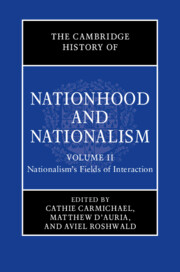Book contents
- The Cambridge History of Nationhood and Nationalism
- The Cambridge History of Nationhood and Nationalism
- The Cambridge History of Nationhood and Nationalism
- Copyright page
- Contents
- Figures
- Tables
- Contributors
- Part I Imperial and Postcolonial Settings
- 1 Building Nation-Empires in the Eighteenth-Century Iberian Atlantic
- 2 Nations and Nationalisms in the Late Ottoman Empire
- 3 The Dutch Empire
- 4 The Habsburg Monarchy
- 5 The British Empire
- 6 The French Empire
- 7 Germany as a “Global Nation,” 1840–1930
- 8 The Russian and Soviet Empire
- 9 The Japanese Empire
- 10 American Internationalism
- 11 The Indian Subcontinent: From Raj to Partition
- 12 Middle Eastern and North African Nationalisms
- 13 African Nationalisms
- 14 Bringing Empires Back in: The Imperial Origins of Nations in Indochina
- Conclusion to Part I
- Part II Transnational and Religious Missions and Identities
- Part III Intersections: National(ist) Synergies and Tensions with Other Social, Economic, Political, and Cultural Categories, Identities, and Practices
- Index
- References
12 - Middle Eastern and North African Nationalisms
from Part I - Imperial and Postcolonial Settings
Published online by Cambridge University Press: 08 November 2023
- The Cambridge History of Nationhood and Nationalism
- The Cambridge History of Nationhood and Nationalism
- The Cambridge History of Nationhood and Nationalism
- Copyright page
- Contents
- Figures
- Tables
- Contributors
- Part I Imperial and Postcolonial Settings
- 1 Building Nation-Empires in the Eighteenth-Century Iberian Atlantic
- 2 Nations and Nationalisms in the Late Ottoman Empire
- 3 The Dutch Empire
- 4 The Habsburg Monarchy
- 5 The British Empire
- 6 The French Empire
- 7 Germany as a “Global Nation,” 1840–1930
- 8 The Russian and Soviet Empire
- 9 The Japanese Empire
- 10 American Internationalism
- 11 The Indian Subcontinent: From Raj to Partition
- 12 Middle Eastern and North African Nationalisms
- 13 African Nationalisms
- 14 Bringing Empires Back in: The Imperial Origins of Nations in Indochina
- Conclusion to Part I
- Part II Transnational and Religious Missions and Identities
- Part III Intersections: National(ist) Synergies and Tensions with Other Social, Economic, Political, and Cultural Categories, Identities, and Practices
- Index
- References
Summary
The current countries in the Middle East and North Africa were all formed, or transformed, in the nineteenth and early twentieth century by processes of partitioning and territorialization propelled by European colonial expansion and local responses to those interventions. As the region’s political topography was remapped before and after the First World War, collective identities were activated, reimagined, and mobilized within and across these newly delineated units. From Northern Africa to the Iranian plateau, an array of nationalisms emerged over the course of this transformation, pairing notions of peoplehood and political sovereignty in new frameworks of identity. For the Middle East and North Africa, the related questions “what is a nation?” and “when is the nation?” are best answered by focusing on a third question: how has the nation (and nationalism) worked in the region over the past two centuries?
Keywords
- Type
- Chapter
- Information
- The Cambridge History of Nationhood and Nationalism , pp. 257 - 279Publisher: Cambridge University PressPrint publication year: 2023

